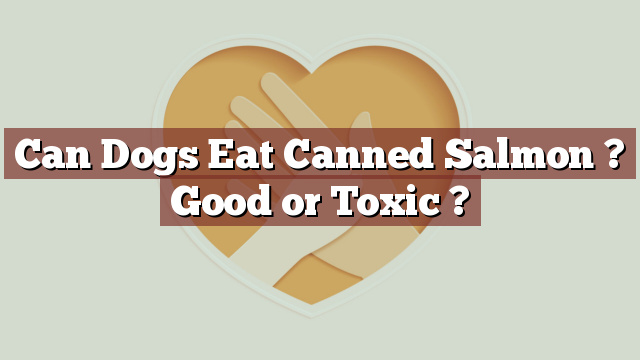Can Dogs Eat Canned Salmon? Good or Toxic?
As pet owners, it is important for us to be aware of what foods are safe for our furry friends. One popular food that often raises questions is canned salmon. Can dogs eat canned salmon? Is it good for them or is it toxic? Let’s explore the nutritional value, safety, potential risks or benefits, and steps to take if your dog has consumed canned salmon.
Nutritional Value of Canned Salmon: Essential Nutrients for Dogs
Canned salmon is packed with essential nutrients that can contribute to a dog’s overall health. It is a great source of high-quality protein, which aids in muscle development and repair. Additionally, salmon contains omega-3 fatty acids, such as EPA and DHA, which promote a healthy coat and skin, support brain function, and reduce inflammation. It is also rich in vitamins and minerals like vitamin D, vitamin B12, and selenium.
Can Dogs Eat Canned Salmon? Evaluating Safety and Toxicity
Yes, dogs can eat canned salmon. In fact, it can be a beneficial addition to their diet when given in moderation. However, there are a few factors to consider before feeding your dog canned salmon. Firstly, it is crucial to choose a canned salmon that is specifically made for human consumption and does not contain any additional seasonings, spices, or oils that may be harmful to dogs. It is also important to ensure that the salmon is fully cooked to eliminate the risk of parasites or bacteria.
Potential Risks or Benefits of Feeding Dogs Canned Salmon
Feeding your dog canned salmon in moderation can provide numerous health benefits. The omega-3 fatty acids present in salmon can help reduce inflammation, improve joint health, and boost the immune system. The protein content supports muscle growth and repair, while the vitamins and minerals contribute to overall well-being.
However, there are potential risks associated with feeding dogs canned salmon. If the salmon contains added seasonings like garlic or onions, it can be toxic to dogs and cause adverse effects such as anemia. Additionally, some dogs may be allergic to fish, so it is important to monitor their reaction after consumption. If you notice any signs of an allergic reaction, such as itching, vomiting, or diarrhea, discontinue feeding canned salmon and consult your veterinarian.
My Dog Ate Canned Salmon, Now What? Steps to Take
If your dog has consumed canned salmon and you are unsure whether it was safe or not, there are a few steps you can take. Firstly, check the label to see if there were any added seasonings or oils that may be harmful to dogs. If the salmon was cooked properly and does not contain any toxic ingredients, monitor your dog for any signs of discomfort or allergic reactions. If your dog experiences any adverse effects, contact your veterinarian immediately for guidance.
Conclusion: Moderation and Proper Preparation are Key
In conclusion, dogs can eat canned salmon as long as it is prepared properly and given in moderation. The nutritional value of canned salmon can provide various health benefits for dogs. However, it is crucial to choose a salmon product that is free from harmful additives and to ensure that it is fully cooked. If you are uncertain about the safety of canned salmon or if your dog has any underlying health conditions, it is always best to consult with your veterinarian before adding it to their diet. Remember, moderation and proper preparation are key to keeping your furry friend healthy and happy.
Thank you for investing your time in exploring [page_title] on Can-Eat.org. Our goal is to provide readers like you with thorough and reliable information about various dietary topics. Each article, including [page_title], stems from diligent research and a passion for understanding the nuances of our food choices. We believe that knowledge is a vital step towards making informed and healthy decisions. However, while "[page_title]" sheds light on its specific topic, it's crucial to remember that everyone's body reacts differently to foods and dietary changes. What might be beneficial for one person could have different effects on another. Before you consider integrating suggestions or insights from "[page_title]" into your diet, it's always wise to consult with a nutritionist or healthcare professional. Their specialized knowledge ensures that you're making choices best suited to your individual health needs. As you navigate [page_title], be mindful of potential allergies, intolerances, or unique dietary requirements you may have. No singular article can capture the vast diversity of human health, and individualized guidance is invaluable. The content provided in [page_title] serves as a general guide. It is not, by any means, a substitute for personalized medical or nutritional advice. Your health should always be the top priority, and professional guidance is the best path forward. In your journey towards a balanced and nutritious lifestyle, we hope that [page_title] serves as a helpful stepping stone. Remember, informed decisions lead to healthier outcomes. Thank you for trusting Can-Eat.org. Continue exploring, learning, and prioritizing your health. Cheers to a well-informed and healthier future!

